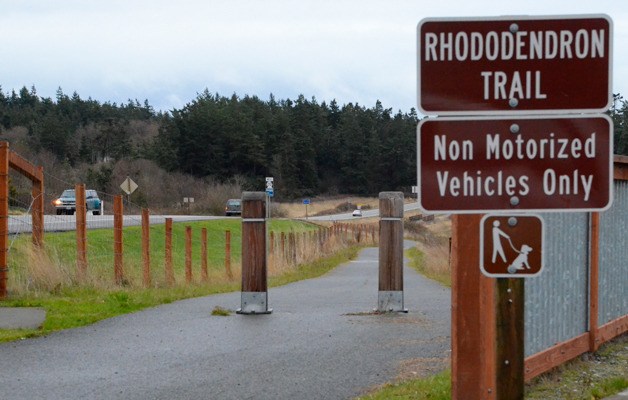An unexpected discovery has driven up the cost of Freeland Trail and will likely delay the project’s completion.
Public Works Director Bill Oakes alerted the Board of Commissioners on Wednesday that a wetland had been identified on the northern section of the planned path along Highway 525.
It was not only a surprise for project planners but it will also affect the total price tag and the project’s timeline.
“It’s caused extra work both in design and (wetland) mitigation,” Oakes said.
The trail, which will mirror paved paths such as Rhododendron and Kettles Trail on Central Whidbey, will stretch about one mile through Freeland, from the intersection at Main Street to Bush Point Road.
They are all part of a larger and long-range county parks plan to build a trail system that snakes along the state highway from Deception Pass to the Mukilteo ferry dock. Segments are to be completed as funding becomes available.
As for the latest portion in Freeland, the trail is planned to run along the south side of the highway, providing a pedestrian pathway through town and to a Island Transit park and ride planned at the intersection at Bush Point Road.
The surprise wetland is located in the fields across the highway from Nichols Brothers Boat Builders and has forced the project to be divided into two phases, Oakes said.
The section between Main Street and Cameron Road will be built first and the rest will follow once the county’s hired consulting firm, Otak, has made the necessary design and permitting modifications.
Oakes requested an approximately $37,000 amendment to Otak’s contract to address the changes. The increase, which will be voted on by the board Monday, Dec. 24, raises the maximum contract amount to $165,000.
Oakes said the inadvertent discovery will require the construction of a trestle that spans the sensitive area. Those costs have yet to be determined but will likely delay completion.
According to Oakes, the entire project is expected to run about $1 million. About $800,000 of the tab will be paid with federal grants and the remainder with county road funds.
While only about $600,000 of the federal funds have been acquired, Oakes planned to have the rest secured in time for construction on Phase 1 to begin this summer.
The hope is that the wetland mitigation planning will be completed in time for construction of both phases to be seamless but there is a good chance phase two will be delayed.



